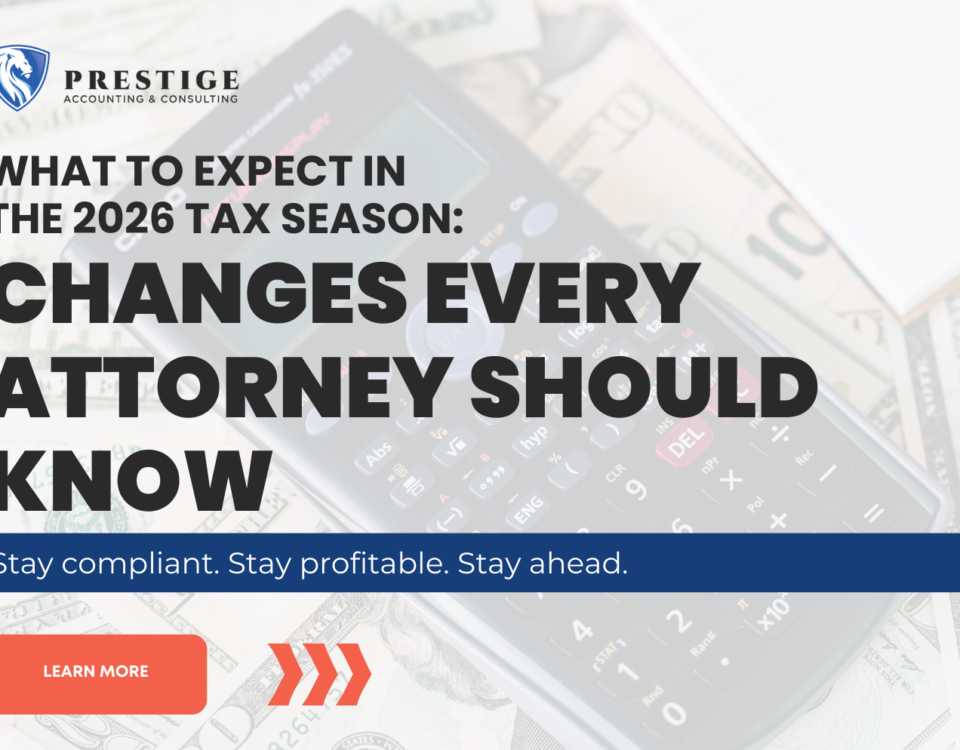
Profit vs. Cash Flow: Why You Might Feel Broke While Growing
July 24, 2025
How to Use Financial Reports to Make Better Hiring Decisions
July 31, 2025
Categories
How to Prepare for a Surprise IRS Notice or Audit
Most attorneys believe they’ll never face an audit.
They assume because they’re not doing anything “wrong,” the IRS won’t come knocking.
Here’s the truth: the IRS doesn’t audit based on guilt. It audits based on gaps, inconsistencies, and signals. And law firm owners—especially solo and small practices—hit those audit triggers more often than they realize.
Whether it’s a mismatch on a 1099, irregular owner draws, trust account discrepancies, or self-reported income that doesn’t align with your industry average, audits can be initiated by seemingly small red flags. And when they do happen, your financial records either protect you… or expose you.
What Triggers IRS Audits for Law Firms?
Let’s get real. These are common IRS triggers that apply directly to attorneys and law firm owners:
- High deductions relative to income – If your firm reports $120K in income and $90K in deductions, the IRS wants to know how you’re running a business on $30K.
- Large charitable deductions without documentation
- Unusual shifts in income or expenses year to year
- Failure to issue 1099s to contractors
- Inconsistent trust account activity vs. reported income
- Improper classification of personal expenses as business deductions
- S-Corp owners not paying themselves a reasonable salary
- Cash-heavy practices without solid tracking
Even if you’re 100% compliant, being unprepared can make the audit painful, expensive, and stressful. That’s why audit readiness is a financial strategy—not just a reaction.
The 3 Rules of Audit-Ready Firms
1. Your Records Must Be Complete—and Accessible
Good intentions won’t save you during an audit. You must be able to prove:
- Where every dollar came from
- Where every dollar went
- That your personal and business expenses are separate
- That your trust accounts are fully reconciled and audit-ready
This means using bookkeeping software, not spreadsheets. It means storing receipts and having a clear chart of accounts. And yes—it means reconciling your trust account monthly (if not more often).
IRS agents don’t care how hard you worked. They care what you can prove.
2. You Must Know Your Risk Areas
Most lawyers assume if they file on time, they’re safe. But audit risk isn’t about punctuality—it’s about patterns.
For example:
- If you take large, unstructured owner draws while reporting low income, that’s a red flag.
- If your legal assistant is paid via Venmo without a 1099, that’s a red flag.
- If you write off a retreat as “CLE” with no agenda or receipts, that’s a red flag.
And if your financial statements can’t quickly show what’s deductible and why, it invites more scrutiny.
3. You Need a Mid-Year Review—Not a Year-End Panic
Most financial reviews happen in March.
That’s three months after the year ends—too late to fix most issues or maximize deductions.
A mid-year review (right now, in Q3) helps you:
- Identify and fix gaps before they become audit triggers
- Correct categorization errors while they’re still fresh
- Ensure you’re up to date on 1099 tracking, payroll filings, and trust account compliance
- Plan owner draws and tax payments based on current profit—not outdated estimates
It’s like trial prep: you don’t wait until the morning of court to gather evidence. You prepare ahead so you’re ready if it happens.
What Happens When You Get a Notice?
Most IRS audits don’t start with a knock on the door. They begin with a letter—a CP2000, for example—stating there’s a discrepancy.
You may be asked to:
- Justify a deduction
- Prove income that wasn’t reported
- Explain a trust account transaction
- Submit documentation for payroll taxes or estimated payments
And you typically only have 30 days to respond.
If your books are sloppy, your receipts are missing, or you “meant to go back and fix that,” the process quickly turns from administrative to adversarial.
The Real Cost of Being Unprepared
Even if you win the audit, you’ll lose time.
You’ll lose energy.
You’ll lose the mental space you need to run your firm, serve your clients, and build your brand.
You might also face:
- Late penalties
- Interest on underpaid taxes
- Legal or accounting fees
- Damage to your professional reputation if trust account issues arise
In short: don’t wait until you get the letter. Prepare like it’s coming.
What a CPA Who Works with Lawyers Will Actually Do
At Prestige Accounting and Consulting, we don’t just clean up your books—we build financial systems that protect your license and your peace of mind.
When you work with us, we:
- Ensure every deduction is justified and documented
- Reconcile your accounts—including IOLTA—monthly
- Flag tax risks and fix them proactively
- Help you interpret financial data so you’re ready before the IRS asks
We’ll give you an honest look at where your risks are—and how to fix them fast.





